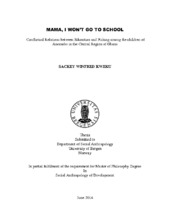| dc.description.abstract | It is on records that the Central region along the coastal stretch of Ghana was the first to have received formal education during the colonial period as early as the 18th century. This is evident by the fact that the region serves as the hub of one of best and oldest educational institutions in Ghana, which have produced many scholars. After making such early strides in education, one would have expected steady progress in school enrolment among children in most communities in the region. Paradoxically, recent reports show rather a gloomy picture of declining school enrolment among children in the region, even compared with other regions of the country. The ongoing debate about the low school enrolment in Ghana's coastal areas has widely centered on cost. From the 1990s, the government of Ghana has undertaken several educational programs and policies intended to increase school enrolment in these fishing communities; notwithstanding, nothing has come out of these policies. The central assumption of these debates is that access to educational facilities is significantly impaired by high costs and hence least-cost option interventions would increase school enrolment. The thesis elucidates that beyond these economic factors highlighted as decisive of the recent school enrolment trend in the region, sociocultural factors are equally important in such analyses and hence deserves attention in the country's educational policy debate. Based on an ethnographic approach, the thesis discusses the broader factors that account for school enrolment trend in a fishing community in the Central region of Ghana to shed light on this debate. In the course of the fieldwork, both the parents and the children of Anomabo expressed the relevance of education, yet they are confronted with several quandaries for choosing between education and their traditional occupation (fishing), hence this conflict. The preference for fishing and related businesses over school as expressed by most parents and children cannot be reduced to solely economics (poverty) but also the fact that the livelihood is extricable entwined with their way of life. Children from fishing households are therefore torn between choosing fishing livelihood and school or at best ought to struggle to manage the two simultaneously. My argument in this thesis is that, even though cost plays a cardinal role in influencing access to education, a range of sociocultural factors nonetheless are more telling on school enrolment in Anomabo. The major focus of the study is to examine the conflictual relations existing between education and fishing among the children of Anomabo. The "conflict relations" does not only denote factors that inhibit school attendance but also issues that may constrain proper concentration in classrooms. The study sheds light on how fishing and its related activities such as fish trading attracts and keep children from school. The world views of the people are explored using political ecology framework, phenomenological perspective and the concept of intergenerational relations. | en_US |
